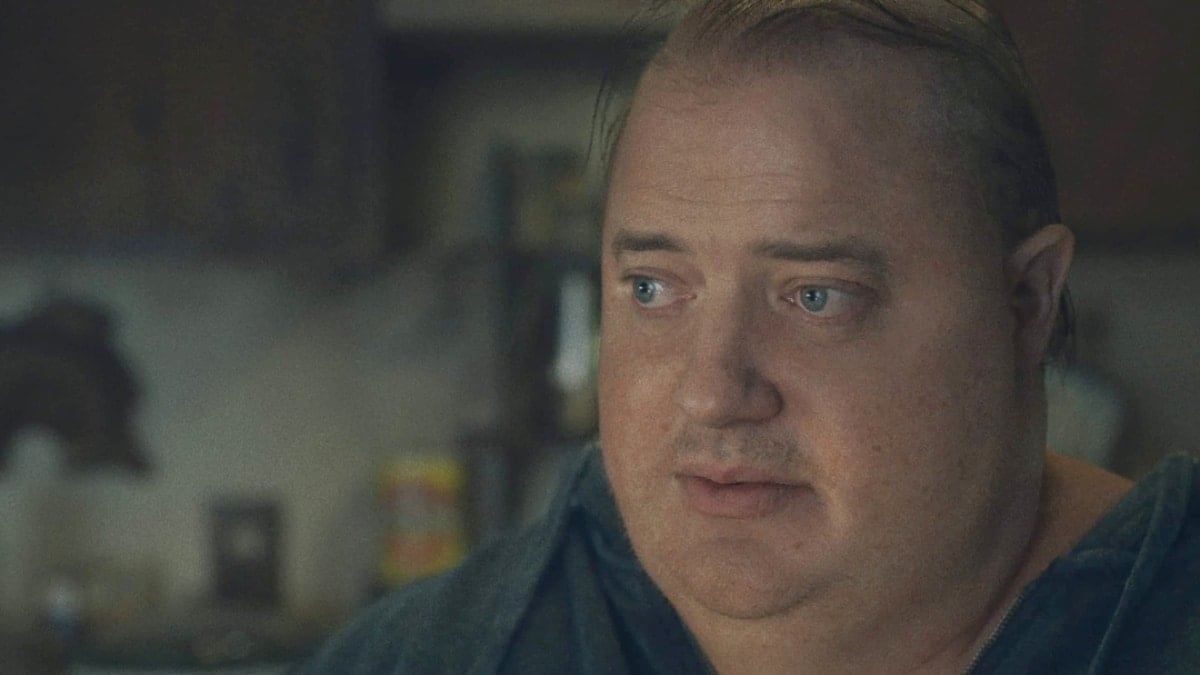
The Whale is an ugly film. It confronts self-sabotaging in a way most viewers will find uncomfortable. It’s an intentional decision fed to us by a director who proudly aims to alienate himself from crowd-pleasing affairs.
A movie that opens with an overweight character in isolation, pleasing himself to an adult film, only to be interrupted by heart attack symptoms, is quite a tone to set. But in the year 2022, it might be the most relatable thing it can possibly say about our trajectory.
The Whale swims head-on into themes of loneliness, bitterness versus love, grief, and authenticity. And while it is an ugly experience, there are beautiful elements lurking underneath it all.
The film stars Brendan Fraser as Charlie, a reclusive man who weighs 600 pounds. When we meet Charlie, it’s understood that he is in pain, and not just from the side effects of being overweight. He lost a loved one to suicide, a man he loved, and it is said to be a result of religion. A very true-to-life scenario, with suicide being the number one cause of death among LGBTQ.
Charlie teaches online English classes from Zoom. He hides not just in his home from the rest of the world, he also keeps the camera off as he teaches virtually.
The only consistent connection in his life is Liz, a feisty yet loving nurse and caretaker of Charlie. Hong Chau gives a riveting and show-stealing performance as Liz. She is fierce and intimidating but we eventually understand why she has become hardened spiritually as well as emotionally.
We are also introduced to Thomas (Ty Simpkins), a missionary from New Life who is attempting to save people in Idaho. After meeting Charlie, he devotes all his energy to bringing Charlie to Jesus.
Then there is Charlie’s estranged daughter Ellie (Sadie Sink). Charlie hopes to undo the damage he has inflicted upon her by trying to make Ellie see the good within herself. But Ellie is cold and resentful, and any form of relationship she wants with Charlie is purely transactional.
The weight of pain in The Whale
Everyone in this film is carrying emotional baggage. The Whale is just a metaphor for how pain (whether it’s depression, grief, etc.) outwardly changes people. There has been much debate on whether The Whale is too insensitive towards the obese. It never felt judgemental of his condition but this reviewer cannot speak for others.
Charlie’s condition feels more like a state of being. Yes, he is 600 lbs on the surface but depression on its own can weigh 600 lbs mentally. He has lost the love of his life, has no family, and his daughter hates him. The weight of that alone would make getting off the sofa difficult for anyone.
Charlie’s isolation and not wanting to be seen on camera has layers of social commentary about the loneliness of coming out as a member of the LGBTQ community. When the world labels and makes one a societal outcast, through religion, prejudice, etc., the bravery alone just to walk outside has to take unimaginable strength.

A common motif recurring in Darren Aronofsky’s work is destruction (whether it’s self-destruction or external). With Requiem for a Dream, it was pleasure through drugs; The Wrestler had an athlete destroying himself to be loved by anyone; Mother! was a metaphor for Mother Earth being murdered by its inhabitants. Even the story of Noah involves God flooding the Earth as a means of necessary destruction.
The Whale sees the same motif, with Charlie letting himself become ruthlessly overweight. He eats as a means to numb himself to the point of near suicide. Charlie has lived a life he regrets and is grief-stricken, and his self-sabotage tendencies might be a little too late by the time Ellie reappears in his life.
However, Charlie is not the only one suffering in this movie. Each character in The Whale is carrying their own form of pain or strife in their lives. Charlie is depressed but is trying to get Ellie to rediscover her value. Thomas of New Life Church has his own form of conflicts that are later revealed, but he wants to save Charlie so he can be accepted into heaven (oftentimes to a fault). Liz (Charlie’s nurse) has lost someone but she is making the best of it by taking care of Charlie the best she can.
Charlie’s daughter Ellie is bitter about having no father for so many years. But her true sense of love for others is unwittingly displayed by her actions–and Charlie sees it. Because of this, The Whale is a meditation on achieving kindness in the thick of bitterness and finding value in one’s self when it feels stolen.
There was a lot of angst online about Sadie Sink’s performance as Ellie. Specifically, it seems some critics have grown tired of the dictator-like child tropes in movies. This reviewer would have to disagree. Sink’s viciousness is the perfect balance to Fraser’s softness. And with Brendan Fraser’s emotionally devastating and brilliant performance, both of them make the film have a whale-sized heart.
The Whale is a bitter lesson about love
The Whale for all its ugly exterior has so much beauty to unpack beneath it. Even if someone hates the film (which is a perfectly valid response), the conversation will continue long after the experience. To this end, the movie is a success.
It is deeply moving, somewhat devastating, and thought-provoking. Not to mention, it contains one of the best comeback performances by an actor (Brendan Fraser) in recent years.
It has so many layers to unpack about the human condition. There are a lot of reasons to be bitter in life, but The Whale tells us love remains possible. For that alone, it’s one of the best films of the year.
For more reviews at Monsters and Critics, check out our coverage of She Said and Good Night Oppy.
The Whale expands wide theatrically today.